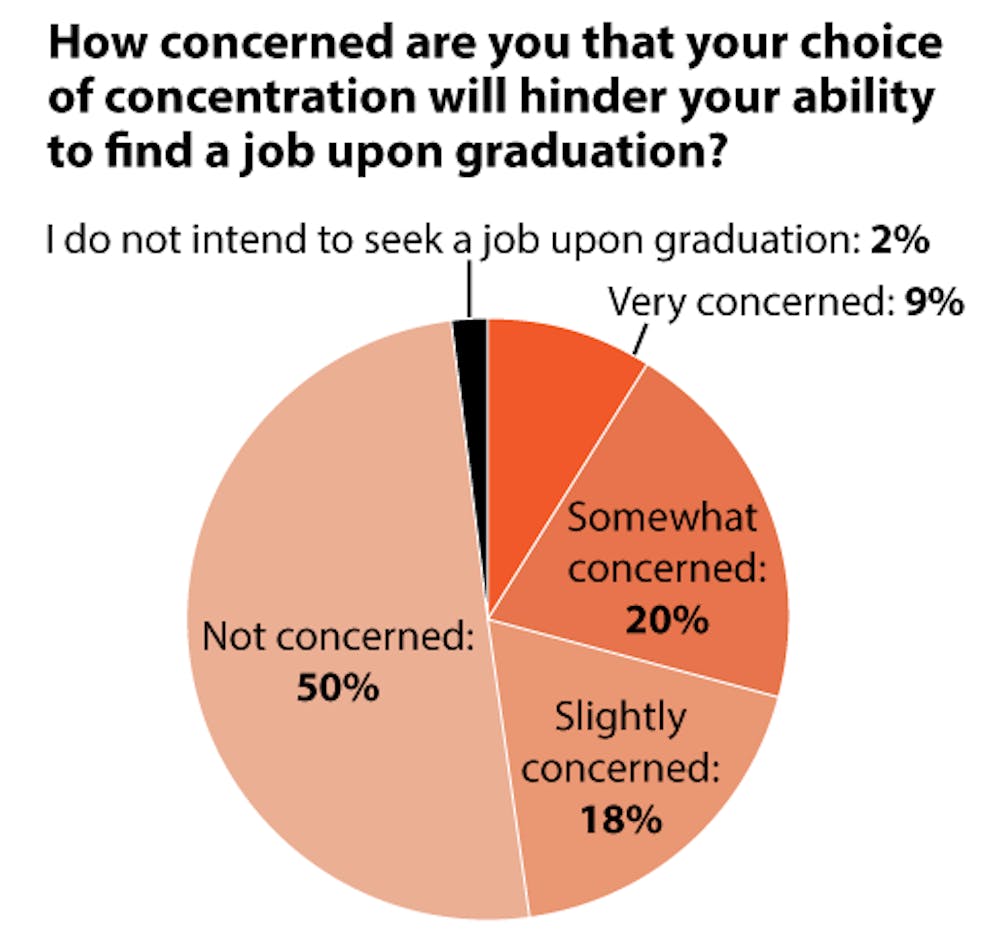Though the economy’s slow recovery is making it harder for students to land jobs, many sophomores rushing to declare their concentrations before Tuesday’s deadline were pursuing their passions without worrying about getting hired, according to the results of a Herald poll conducted March 3-4.
Approximately half of undergraduates are not concerned their concentration choices will hinder their ability to find a job after graduation, the poll found.
Of the students surveyed, around 38 percent said they were either somewhat or slightly concerned about their concentrations and future job prospects, while 9 percent said they were very concerned.
Humanities concentrators indicated more concern about employment prospects than those studying the social sciences, life sciences or physical sciences. Around 12 percent of humanities concentrators said they were very concerned, compared to 6.1 percent of physical sciences concentrators. And approximately 27 percent of humanities concentrators said they were somewhat concerned, more than double the 11.7 percent of physical sciences concentrators who selected that answer choice.
Department heads and administrators said they have found that while employment influences students’ concentration decisions, it is not the sole or determining factor.
“Students who I have talked to have been attracted to the courses offered in the concentration,” said Thomas Doeppner, associate professor of computer science and vice chair of the department. “If your only justification was employment, you probably would not make it very far in the field.”
Brendan McNally, associate director of the Business, Entrepreneurship and Organizations program, said while the concentration prepares students well for several different career paths, he has never heard any students say they “want to study something else but are doing BEO just for employment purposes.”
“I don’t think students are thinking about careers specifically when declaring a concentration,” said Andrew Simmons, director of the CareerLAB. “In my experience, what they have considered are their skills, abilities and interests.”
Students across disciplines said academic interest was the main factor driving their concentration choices, though many also took future career prospects into consideration.
“I know that mathematics keeps many job options open, but I did not really have that in mind when I picked it for my concentration,” said George Hauser ’16. “I was just interested in the subject.”
Crystal Kim ’16, an English concentrator, said, “I want to be as prepared as possible for my future career while doing something that I love and found that English was a good medium for that.”
Many students and faculty members were unsurprised by the survey results, which they said reflected their experiences in the classroom.
Alex Rubin ’14, a computer science concentrator, said he thinks the majority of his peers are not concerned about finding employment after graduation. “We may not get to work for the company we want to, but at the end of the day, everyone gets a job.”
Dakotah Rice ’16, who is pursuing an independent concentration in politics, philosophy and economics, said students who have completed finance or consulting internships that often lead into full-time offers may feel less pressure about employment. “As soon as you get to Brown, you see all these options you have after graduation,” he said. “And when you see people following the path to pursue them, you find yourself doing the same.”
McNally said he thinks recent graduates are realizing they should be less concerned about their concentrations when seeking employment. “Your concentration can be an excellent indicator of your academic interests, but it’s how you convey what you learn and can bring to the job that matters,” he said, adding that all Brown students learn research and critical thinking skills regardless of concentration.
“What students learn at Brown allows them to navigate an economy where change is constant,” Simmons said, adding that students should start thinking about their careers early on. “You can have the most job-oriented concentration, but if you don’t start planning your career until your senior year, you are not going to get anything.”
Some students said salary is not a high priority when it comes to employment and concentration decisions.
Hauser said future income does not play a large role in determining his post-graduation plans. “I’ll take a job that will let me live,” he said. “I think a lot of students do what they are passionate about, and if it pays well, that’s for the better.”
“Computer science jobs across the board pay everyone well enough, so that’s not an area of concern for me,” said Rubin, who added that he plans to prioritize factors like the type of job and its location.

ADVERTISEMENT




